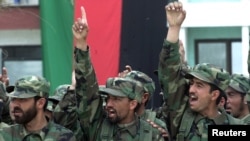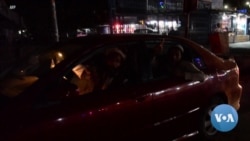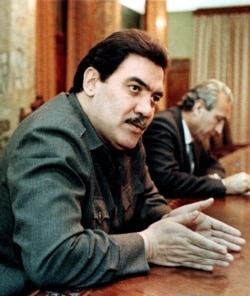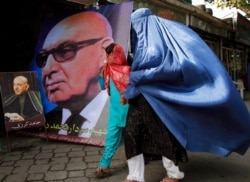Afghanistan has never been short of slogans for rallying support from its war-torn population. One dominant slogan, "Allahu akbar," which means "God is great" in Arabic, has, however, multiple owners.
The slogan unified Afghans under the leadership of the modernist king Amanullah Khan against the British in 1919; mujahedeen (holy warriors) in their jihad against the Soviets in the late 1980s; and thousands of Afghan residents against the Taliban's latest surge of violence in the country.
Afghans chanted the slogan as a symbol of popular resistance to the Taliban when rallying in support of the Afghanistan National Defense and Security Forces (ANDSF) in major towns and cities.
It started in the western city of Herat, where the locals welcomed the ANDSF as their redeemers against the advancing Taliban during the first week of August. The slogan was later echoed in the country's capital, Kabul, as well as in other cities and towns across the country. It became a symbol of defiance.
Afghan Vice President Amrullah Saleh soon tweeted that God isn't a toy in the hands of the Taliban terrorists and that Herat is chanting "Allahu akbar" loud and clear.
Taliban spokesman Zabihullah Mujahid responded the next day on Twitter: "It is our slogan. It is not the slogan of the American slaves and seculars."
Abdul Bari Jahani, a former Afghan minister and retired VOA broadcaster, said the "Allahu akbar" slogan is not new in Afghanistan. It united Afghans when the former secular king Amanullah Khan, seeking the country's independence, launched armed attacks against British forces in May 1919, he said. Britain was then ruling what is now Pakistan, part of the British Raj (rule).
The slogan also reached Hollywood, and it can be heard in the movie Charlie Wilson's War, a film named after the U.S. legislator from Texas who supported the Afghan mujahedeen in the 1980s against the Soviet Union's invasion of Afghanistan. In one scene, Representative Clarence Long (played by Ned Beatty), another mujahedeen supporter and chairman of the subcommittee on foreign operations of the House Appropriations Committee, joins Afghans in chanting "Allahu akbar."
Jihadi groups, terrorist organizations and the Taliban have turned "Allahu akbar" into their signature slogan in Afghanistan and elsewhere in recent years. There are troves of videos showing terrorists or suicide attackers shouting the slogan before blowing themselves up in a market or beheading their opponents in public. Such incidents have made it one of the most terrifying mottos in the West as well as in Muslim countries.
Afrasiab Khattak, a former Pakistani senator who had crossed paths with high-ranking Afghan officials, including presidents and generals, during his yearslong stay in Kabul, said the fight for building a narrative had always been a complex matter in Afghanistan.
Slogans and narratives during communism
The communist era (1978-92) focused on progressive patriotism, education, land reforms and women's rights. Khattak, who spent decades in Afghanistan, said the slogans reflect these themes.
The last president of the era, Mohammed Najibullah, commonly known as Najibullah or Dr. Najib (1986-92), for example, adopted the slogan "Watan Ya Kafan" (country or shroud/death) in a bid to reverse the slogan of jihad against his government in Afghanistan. Another one of Najibullah’s was "Sar Warkawoo, Sangar ne Warkawoo" (will die but will not leave the trench), in response to seven major jihadi groups with bases in Pakistan trying to topple his government in Kabul. The current Afghan president, Ashraf Ghani, also used the latter slogan in a recent speech.
Najibullah's predecessors, the leading members of the People's Democratic Party of Afghanistan (PDPA) – Babrak Karmal (president from 1979-86), Hafizullah Amin (September-December 1979) and Nur Muhammad Tarakai (1978-79) — had more radical slogans for a conservative and tribal Afghan society, said Mujawar Ahmad Zyar, a U.K.-based Afghan historian and author.
The radical slogans in that era polarized Afghan politics, pushing society to both the far left and the far right. Zyar said the Islamist parties chanted "Death to Tarakai," "Death to Karmal" and pro-Islam slogans.
Tarakai and Karmal were both members of the PDPA, but they represented rival factions of the party, Khalq and Parcham, respectively. The first split in the PDPA happened in 1967, according to Ludwig Ademec's Historical Dictionary of Afghanistan. The unification and split of the PDPA was a recurring political exercise with consequences as harsh as assassination or coup d'état against the sitting Marxist leader.
Zyar said the far-left PDPA-led Afghan government came up with pro-farmers slogans such as "Tal De Vee Kargar" ("long live the laborer"); "Mzaka da Dehqanano da" ("land belongs to farmers"), an attempt to abolish absentee land lordship; and "Kor, Dodai, Kali" ("home, bread, clothes"). The latter was also adopted in the Afghan national anthem during the Marxist era, Zyar said.
Pre-Marxist Afghan political mottos
The immediate pre-Marxist Afghan political scene was under the influence of Sardar Muhammad Daud Khan. He staged a coup against his cousin King Zahir Shah in 1973. Already an old fish in the Afghan political pond, he had served the king as prime minister from 1953 to 1963. The dominant slogan in Afghanistan at the time during Khan's presidency was "Tal De Vee Pakhtunistan" ("long live Pakhtunistan"), which called for a separate state for Pashtuns living in Pakistan.
Khattak recalled meeting with Daud in early 1975 in Kabul, where Daud asked him about Pakistanis' response to his policies in Afghanistan and made fun of what he called the propaganda against him in Pakistan. Khattak recalled the banners in Kabul inscribed with Daud's favorite slogan: "Walard Da Bari Ard De" ("Taking opposition is a precondition of success").
Daud trusted the leftists, crushed the emerging Islamist movement and formed his own National Revolutionary Party, according to Adamec. His opponents, however, were chanting "Death to Daud." The Saur Revolution marked the end of Daud's presidency, and life, on April 27, 1978, after the PDPA stormed his Kabul palace.
The comparatively modern Afghan monarchy from 1919 onward was mainly promoting patriotism, loyalty to the royal family, education and social developments in Afghanistan and was supportive of nonalignment in international politics.
Zyar said patriotic slogans were very much there from 1919 to the 1970s, and some of them are still being used in national anthems.
"Tal de Vee Afghanistan" or "Javed bad Afghanistan" ("long live Afghanistan"), "Tal de Vee Zamunga Isteqlal" ("long live our independence") and "Umar de Der Sha Badshah" ("long live the king") were common slogans chanted during freedom marches and military parades and used in national anthems.








